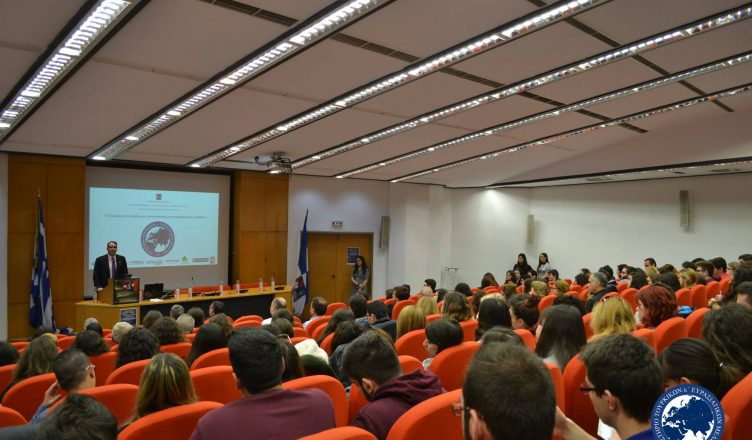
Turkey’s moves on the International Chessboard
An informative scientific colloquium took place on Wednesday the 30th of March 2016 in the University of Piraeus.
The topic of the colloquium was “Turkey and the strategic realignments of a region in transition”, during which the speakers, who were both professors of the University as well as junior researchers, presented their researches. The conference was attended both by students and the public.

In the first session entitled “Challenges in Foreign Affairs: Turkey, Caucasus and Middle East”, researches examining Turkey’s aspiration to become a dominant actor of the region were presented. Initially, security issues in Caucasus were examined with focus on the relations between Turkey and Azerbaijan. Following, there was a special mention to the case of Syria, where the paper presented examined all the actors involved, starting from the self-proclaimed “Islamic State” and the Kurdish resistance to the destabilization of the Asad regime. The outcome of the study indicates the difficulties of the implementation of such an ambitious project, like Turkey emerging as a regional hegemonic power. Next, the Russian involvement in the ongoing Syrian crisis was presented. This particular study came to the conclusion that Russia’s hegemonic aspirations, including the Russian interests in Syria, contradict those of Turkey. Moscow’s involvement in the Syrian civil war demonstrates that the country’s interests in the area, such as maintaining the control of the naval basis, are very important. The issue of Ankara’s policy towards the Kurds of Syria was also touched upon, along with the “threat of violence” in international relations. Finally, a paper dealing with the international economic relations between Turkey and the states that experienced regime changes during the “Arab Spring” was presented.

The second session took on matters of “Domestic Politics, Security and democratization in Turkey”. At first, the role of the Press in the democratization of Turkey was scrutinized. The social media used by the vast majority of the public, replacing the Press in shaping views, was examined as a contemporary means of expression of the public opinion. The fact that Turkey functions peremptorily, using censorship, takes the country away from the prospects of adapting to the European ideals. The European prospects of Turkey while the country is run by the government of the Islamic party “Justice and Development”, was another topic under discussion. Next, the issue of the security relations between Ankara, Cairo and Athens was also examined under the scope of balancing attempts of states with hegemonic tendencies. Following, the refugee crisis was also studied as a means of pressure, a policy used by Turkey related to its attempts to impose its presence and undermine the sovereignty rights of Greece in the Aegean Sea. All the above, in combination with Turkey’s aggressive foreign policy, compose a state fairly distanced from the idea of Europe, which shows great difficulty in adjusting in the European ideals. The last paper examined the “cyber security” attacks that the Turkish political and economic institutions faced.

The third session was about the “Upheavals in the Eastern Mediterranean, the issue of Cyprus and the EU”. The speakers stressed that Turkey’s strategy in order to emerge as a regional hegemon seems to fail, due to mishandled moves. In those mishandlings may be included the “strategy of zero problems” that the country opts for, the non-acceptance of a contemporary state-centered international ordinance which surpasses the Islamic faith, as well as the undermining -on behalf of Turkey- of the plans of the great powers. Moreover, the issue of Cyprus was examined, which was seen under the light of geostrategic and national interests of Turkey, since a potential resolution of the issue would have direct strategic consequences in the country. The relations between Europe and Asia are defiantly mirrored in those between Brussels and Ankara. The refugee crisis seems to have become an advantage for Turkey while in negotiations, and while waiting for its accession in the EU.

In the fourth session the discussion of the panel focused on “Energy, Economic and Technological Challenges in Turkey and the Eurasian Region”. Initially, the topic of political economy of Greece and Turkey, influenced by the international economic crisis and interesting aspects of the economic collaboration between the two countries were brought about. The consequences of the IMF Programs in the two countries were evaluated, while an attempt was made to highlight prospects of international cooperation between Greece and Turkey. Additionally, Turkey’s energy policy was presented and the country’s energy infrastructures, inland energy sources and its dependency on import energy sources were analyzed. Further analysis focused on energy strategy for the exploitation of energy resources in the Eastern Mediterranean. Finally, the E.U. and Russia interactions for the implementation of an energy network, which planed to cross the Black sea region, were examined.

The fifth and final session presented “The Turkish Strategy before International Challenges and its Illustrations”. The session started by examining the consequences of the news topics selection in shaping Turkey’s image in the Press. Moreover, a paper dealing with questions of Turkish higher strategy in relation to contemporary reality was presented. A final paper examined the strategic choices of the Islamic governments of Turkey, which aimed at fulfilling the necessary prerequisites in terms of power so Turkey could participate in the highest degree of the international system. Nevertheless, the outcome seems to be rather disappointing, given the gradual isolation of the country in the Middle East.

Source: S. Argyri, “Οι κινήσεις της Τουρκίας στη διεθνή σκακιέρα στην επιστημονική ημερίδα του Πανεπιστημίου Πειραιώς”, Frapress, 15 April 2016. (in Greek)

